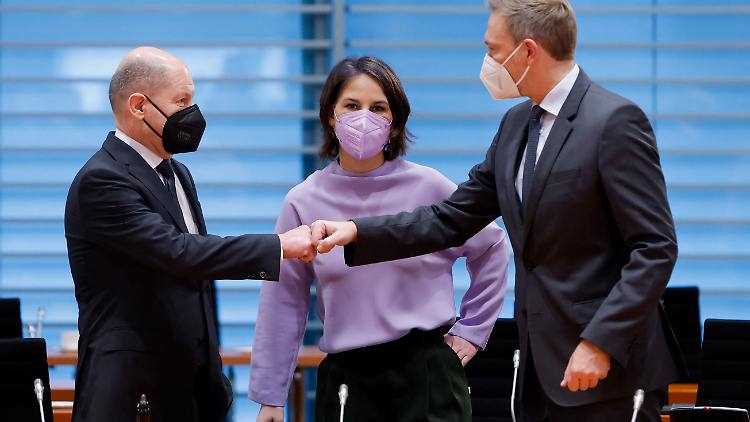People of the week: The Cabinet
Baerbock Top. Scholz grows. Lambrecht, Spiegel and Faeser flop.
By Wolfram Weimer
03/15/2022, 09:48 am
The new traffic light government has been in office for 100 days. After initial problems, some in the cabinet have found their roles. Some cut a strong figure, others downright embarrass themselves. A first balance sheet.
The traffic light government has completed its first 100 days. After a rocky start, the Ukraine war is causing a complete reshuffling of agenda, priorities and behavior. Overall, the government is doing well in the crisis. The majority of Germans agree with the course of new decisiveness.
On closer inspection, however, there are significant differences in cabinet performance. While the chancellor, who initially seemed insecure, has found his stature, the foreign minister cuts a really good figure. The Habeck-Lindner duo of finance and economics ministers may not shine, but they keep the traffic light structure together respectably and professionally. But there are also three women ministers whose 100-day record is really bad.

Olaf Scholz, Annalena Baerbock and Christian Lindner talk before a conference on the Ukraine crisis.
(Photo: picture alliance/dpa/Reuters/Pool)
Initially, the chancellor clearly had problems adjusting to his new role. Olaf Scholz (SPD) seemed insecure and taciturn in the first few weeks, disappeared for days, lurched in the energy and vaccination debate and was literally sent to the second row by Emmanuel Macron in terms of European politics. In 2022, the French President demonstratively claimed Europe’s leadership role, which Angela Merkel held until 2021. Scholz was initially only polite restraint. Even in the run-up to the Ukraine crisis, he initially found no clear line. The Putin friends in his own ranks, from Gerhard Schröder to Manuela Schwesig, complicated his position. For weeks, the half-light of the silent fake lay on the SPD man.
But since Russia’s attack, Scholz suddenly seems like a real chancellor. He immediately found the right words and the right positioning. He boldly cuts strategic aisles (arms delivery to Ukraine, strengthening of NATO, 100 billion armament program) in the thicket of despondency. At the same time, he doesn’t overdo it, doesn’t lose himself in war pathos or bullying. He remains level-headed, seeks diplomatic de-escalation and fends off the furor of emotional decisions (from shutting down the pipelines to expanding arms aid to reorganizing European finances) to the detriment of Germany. His greatest weakness – the machine-like lack of emotion – becomes a great strength in the moment of crisis. He managed the turnaround in the first 100 days.
Baerbock – open, modern and with a clear attitude
But the big cabinet winner of the first 100 days is Annalena Baerbock (Greens). As the top candidate of the Greens, she was stuck in a scandal-ridden election campaign, her reputation was damaged, and there were concerns in Berlin that the alleged phony would fail due to lack of experience at the Lavrovs of world politics. The opposite happened. From the moment she took office until well into the turmoil of war, Baerbock cut a fine, resolute, professional figure. Your English may be worse than many expected. But her open language, her modern femininity and her clear attitude make an impression – especially in the confrontation with Russia. The Federal Foreign Office, which has suffered for years under a weak minister, Heiko Maas, feels that it is being properly represented again. In the polls, their approval ratings are skyrocketing.
The two heavyweights of the new government, finance ministers Christian Lindner (FDP) and Economy Minister Robert Habeck (Greens) didn’t get off to a bad start. But as the axis men of the tricky traffic light coalition, they first had to keep things together. Unlike Baerbock, they couldn’t distinguish themselves offensively, but had to constantly build internal bridges. Both in the Corona debate and in energy and European policy, in the armament issue and in the petrol discount, the government was threatened with serious coalition crises if Habeck and Lindner had not actively sought to close ranks.
This sometimes harms both of them in their own camps. FDP voters would like faster freedom in pandemic policy or faster tax breaks for energy prices, possibly a return to nuclear power. But Lindner is keeping a compromise course with a view to the coalition peace. Just like Habeck, whose voters feel uncomfortable and ignored when it comes to the armament issue, would like to see a longer mask requirement or a more rigorous shutdown of the Russian gas pipeline and no petrol price discounts.
Both show a high degree of specialist responsibility for their departments and choose a language of caution. Both forgo popular approval points and cheap effects appearances. Both have become something like the traffic light machinists, who are forced by the war to do unpleasant oil change jobs. But both take this duty seriously. Her record of the first 100 days is lackluster on the B grade, but remarkably clean on the A grade.
Buschmann as a lawyer for the traffic light group
A “satisfactory” can be attested to some ministers whose issues suddenly seem invisible, but who are doing a decent job – by Volker Wissing (FDP) via Cem Özdemir (Greens) to Hubertus Heil (SPD). Health ministers were able to present themselves positively Karl Lauterbach (SPD) (Germany’s restlessly admonishing senior physician, whose messages no one wants to hear anymore, but who is regularly right) and Minister of Justice Marco Buschmann (FDP), who defined the exit from the pandemic policy and has become a kind of sly speaker for the government. Buschmann has deepened his reputation as a razor-sharp analyst. Where Lauterbach comes along like the white-coated company doctor, Buschmann comes across as the dark-clothed lawyer of a traffic-light company whose advice is somehow respected by all board members.
But after the first 100 days, there are also four weaker cabinet members. Environment Minister Steffi Lemke (Greens) seems – after she had to hand over climate policy to the Habeck Ministry – downright boned. She is looking for an alternative profiling, but makes a fool of herself in the debate about climate radicalists blocking motorways and loses a power struggle against the transport minister when she wants to push through stricter Europe-wide CO2 limits for cars. In times of aggressive despotism, selfies with the climate minister of the United Arab Emirates seem just as awkward as an unnecessary dispute with Poland over the Oder expansion.
The first 100 days went even worse for Defense Minister than for Lemke Christine Lambrecht (SPD) for the Minister of the Interior Nancy Faeser (SPD) and the family minister Anne Spiegel (Greens). These three are the Losers of the traffic light start. Spiegel was primarily concerned with justifying her unfortunate role as Rhineland-Palatinate environment minister in the Ahr valley flood. It started with a huge legacy (the accusation of not having warned the population and only thinking about its image) and has not been able to shake it off. On the contrary – since her appearance before the committee of inquiry, her public image has been drawn as a cold-hearted power politician on the big stage. The headlines have not read well since then: minister “needed to explain”, minister “under pressure”, “sheer horror”, “shameful”, “creepy”.
Faeser and Lambrecht also drew a lot of criticism. Both politicians come from Hesse, and both are said to see their offices only as transit stations. In the SPD-Hessen, Nancy Faeser is considered the upcoming top candidate in the prime ministerial election campaign to succeed Bouffier. Lambrecht, in turn, would then probably become Minister of the Interior – a post that would suit her much better than the unloved Ministry of Defense. In their current offices, both have so far seemed like foreign bodies.
Faeser too hesitant in distributing refugees
Faeser first occupied the German public with a controversial article in a radical left magazine, then she strayed in foreign policy with an initiative on European asylum policy and finally drew criticism for her anti-Telegram initiative. Ever since the Ukraine war triggered a new refugee crisis in Germany, Faeser has been criticized for poor crisis management. Several interior ministers of the federal states attack them for poor planning and hesitant attitude in the distribution of refugees. Brandenburg’s Minister of the Interior, Michael Stübgen, rumbles: “The admission of the expellees must be coordinated more professionally.” From the CDU boss Friedrich Merz to the Berlin Senator for Social Affairs Katja Kipping from the left, Faeser is currently being pinched.
Christine Lambrecht was similarly caught in the political fire from the start. Lambrecht started with a skeptical press (“Minister in basic training – this is not the right time for the troops”, warned the “Welt”) and promptly caused clumsiness. Hasty personnel decisions caused irritation, then – instead of worrying about the precarious situation in Ukraine – she first addressed right-wing activities in the troops or gender issues. She demanded that the Bundeswehr urgently needed more female generals.
In her first few weeks as secretary of defense, communication seemed almost grotesque. Reports such as “Hoopoe voted Bird of the Year 2022. He’s also at home with the Bundeswehr” or “Gourmet cuisine high above the clouds” when describing the crisis mission to Libya, of all things, caused irritation. When Lambrecht then announced that Germany’s support to beleaguered Ukraine would consist of the ridiculous delivery of 5,000 military hard hats, criticism erupted. The process became a political scandal.
With the radical change of course by Olaf Scholz and the decision for the 100 billion upgrade, Lambrecht of all people now has a key position in the reorganization of Germany’s security architecture. Within the Bundeswehr you can feel the concern whether it is up to this task. Officers complain that Lambrecht is the third time in a row (after Ursula von der Leyen and Annegret Kramp-Karrenbauer) that a woman with no military knowledge has become defense minister. In an acute military crisis in Europe, this is risky.
In fact, Lambrecht is a South Hessian lawyer who made it to the office of Minister of Justice in 2019. She had actually already announced her departure from Berlin politics and immediately refrained from running for parliament again. She has no mandate in the Bundestag and no experience in security policy. She did not want the position of defense minister and only complied with Olaf Scholz’s request. She of all people is now facing what is probably the biggest task for the traffic light government.
